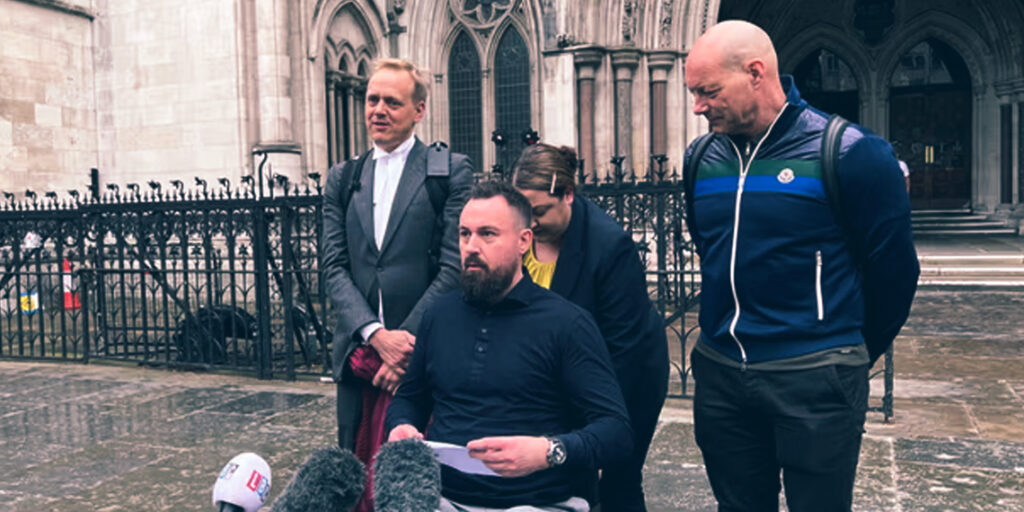A survivor of the Manchester Arena bombing is calling for stronger legal protections against conspiracy theorists after a YouTuber with millions of followers secretly filmed his family in an attempt to accuse them of being “crisis actors.”
Martin Hibbert and his daughter, Eve, now 22, were both left with life-altering injuries from the suicide bombing that claimed 22 lives and injured hundreds more at an Ariana Grande concert in May 2017.
They were the closest people to the bomber to survive, but Eve suffered severe brain trauma, while Hibbert, 48, was paralysed after shrapnel severed his spinal cord.
In October, Hibbert and his daughter were awarded £45,000 in damages after suing former TV producer-turned-conspiracy theorist Richard Hall, who claimed the attack was staged.
Hall made these accusations in videos viewed by tens of thousands of people, suggesting that the bombing was a “well-organised fake terrorist event” involving “fabricated deaths” and over 100 “actors.”
Hall, a former engineer, had also promoted conspiracy theories about the deaths of Jo Cox and Jill Dando, as well as other high-profile events like the Westminster Bridge attack, the Salisbury poisonings, and the disappearance of Madeleine McCann.
His YouTube channel, which was shut down in October 2022, had over 84,000 subscribers, with his videos amassing more than 16 million views, according to the High Court.
During the trial, Mrs Justice Steyn condemned Hall’s actions as “oppressive and unacceptable,” particularly after learning that Hall had secretly filmed Eve and her mother in September 2019.
Hall tracked down Eve in an attempt to prove she was a “crisis actor,” placing a covert recording device on Hibbert’s car dashboard, aimed at the family home.
In his first newspaper interview since the High Court ruling in October, Hibbert revealed how his family only learned of the surveillance two years later, and how it left them feeling terrified and paranoid.
“I came home one day, and Gabby [his wife] was in tears, saying she was scared to be in the house,” Hibbert shared. “It made me fearful to be alone in public until recently. I was thinking: if anyone follows me, there’s nothing I can do. It really affected me more than I realised. It changed how we went about our lives.”
Hibbert is now campaigning for a new criminal offence to protect victims of crime or tragedy from harassment by conspiracy theorists. He hopes the law will be named “Eve’s Law” after his daughter.
He also plans to establish a network of pro-bono barristers to represent victims in such cases on a no-win, no-fee basis, as he believes the high cost of legal fees prevents many from seeking justice.
The legal bill from his case, which involved a four-day trial at the Royal Courts of Justice, amounted to nearly £250,000, with his law firm attempting to recover the sum from Hall.
“When we first discussed this case a couple of years ago, my barrister said I would need £100,000 in an account to even start. Very few people could afford that,” Hibbert explained. “Why should only those with money be able to access justice? Eve’s law could also be a way to give more people access to justice.”
Hibbert, a former football agent, has written a book about surviving the Arena attack and raised over £1m for charity. In 2022, he became the second paraplegic person to summit Mount Kilimanjaro.
Despite two inquiries and a lengthy criminal investigation into the bombing, Hibbert said the most difficult part of the case was being cross-examined by Hall’s barrister during the harassment trial in July.
“It was one of the hardest things I’ve done in my life,” Hibbert recalled. “I was made to feel guilty, and the barrister said that because I have a public profile, I should expect it. It was incredibly tough.”
In her ruling, Justice Steyn said Hall’s conduct had caused “real, lasting and persistent anxiety” to both Eve and Hibbert. Hall has since appealed the verdict.


